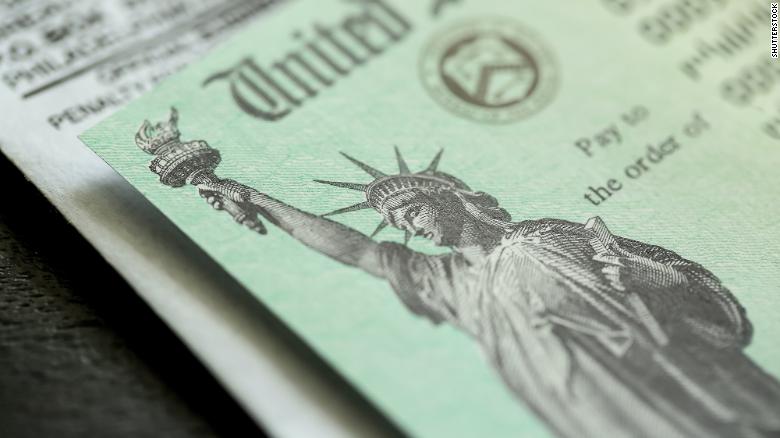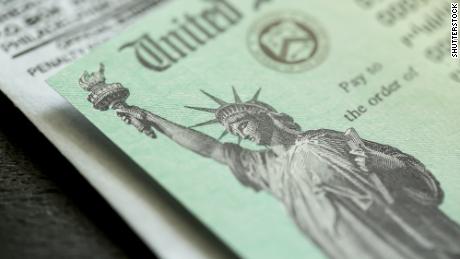A version of this story appeared in CNN's What Matters newsletter. To get it in your inbox, sign up for free here.
Washington (CNN)Some Americans are already seeing the latest round of stimulus payments hit their bank accounts, as the first batch of funds is rolled out.
The payments -- worth up to $1,400 per person -- were included in the $1.9 trillion Covid-19 relief package just signed by President Joe Biden.
If you don't see it yet, don't panic. A Treasury Department official told reporters on a Friday call that checks will continue rolling out in the "coming weeks."
Paper checks are coming too. Though not as speedy as direct deposit, paper checks and prepared debit cards will be sent out before the end of the month.
Starting Monday, you can check the status of your payment using the IRS Get My Payment tool online.
No action is required for most people to receive the money. Social Security recipients and those who receive Veteran Affairs benefits should also receive the money automatically even if they don't file taxes.
CNN's own Tami Luhby and Katie Lobosco walk through exactly how much you can expect and when you can expect it on this special CNN Political Briefing podcast.
Vaccine eligibility will tick up this week
So far, more than 69 million Americans have gotten at least one dose of a Covid-19 vaccine while more than 36.9 million are fully vaccinated, according to CDC data.
But the US is still in a very vulnerable place.
Covid-19 is still spreading rampantly and must be tackled aggressively if we want life to get back to normal soon, Fauci told CNN on Sunday morning.
Even though daily new cases have dropped since January, "over the last couple of weeks, they've plateaued," said the director of the National Institute of Allergy and Infectious Disease.
"When you see a plateau at a level as high as 60,000 cases a day, that is a very vulnerable time to have a surge, to go back up. That's what exactly happened in Europe."
In efforts to boost inoculation numbers alongside those concerns, state leaders across the country are announcing expanded vaccine eligibility:
In Alaska, people living or working in the state who are 16 or older can get the vaccine. Pfizer's Covid-19 vaccine is the only one available for use by people who are 16 or older, while the Moderna and Johnson & Johnson vaccines are both restricted to people 18 or older.
Rhode Island eligibility opened Friday to residents who are 60 to 64 as well as people 16 to 64 with certain underlying health conditions.
In Georgia, residents 55 and older and people with disabilities and certain medical conditions will be eligible for the vaccine starting Monday.
Also starting Monday, Kentuckians 16 and older with any medical or behavioral health condition that the CDC says could be at increased risk of severe Covid-19 illness will also be eligible for the vaccine. Health officials added that smoking will not be in the covered conditions in the state.
Meanwhile in California, people with certain high-risk medical conditions or disabilities will also become eligible for a vaccine on Monday.
Remember: Biden has directed states to open up vaccines to all adults by May 1.
"After this long hard year, that will make this Independence Day something truly special, where we not only mark our independence as a nation but begin to mark our independence from this virus," he said this month.
The latest
Border crisis. Children detained in an overcrowded government-run tent facility at the US-Mexico border say they haven't been able to shower for days or contact their parents, according to lawyers who interviewed them.
More Capitol riot charges. The Justice Department has charged a member of the Proud Boys, alleging he used pepper spray against police officers during the US Capitol insurrection, according to court records.
Biden commits to 'free, open, secure' Indo-Pacific. In a Washington Post op-ed, the President and the leaders of India, Australia and Japan wrote, "in this dark hour, our partnership offers a spark of hope to light the path ahead."
Dr. Anthony Fauci: Covid guidelines 'will be much more liberal' by July 4 if US cases drop. "If by the time we get to the Fourth of July, with the rollout of the vaccine, we get the level of infection so low -- I'm not going to be able to tell you exactly what the specific guidelines of the (US Centers for Disease Control and Prevention) are, but I can tell you for sure (guidelines) will be much more liberal than they are right now about what you can do," the director of the National Institute of Allergy and Infectious Diseases told CNN's Jake Tapper on "State of the Union."
Terry McAuliffe wants to be Virginia's governor again. But with less than three months until the Democratic gubernatorial primary, he's now being pushed by younger, more liberal challengers to explain how he reflects the future of the commonwealth and not the politics of a bygone era.
What a potential Cuomo impeachment would look like. The New York governor would need to be found guilty by two-thirds of the state Senate. Democrats hold 43 of the 63 seats in the legislative chamber. If convicted, the punishment would be removal from office, the Constitution states.
Polling daylight savings time
Most of us lost an hour of sleep last night thanks to the beginning of daylight saving time, which is not an uncontroversial topic.
An AP-NORC poll from 2019 found that just 31% of Americans wanted to move to daylight saving time all year around.
- That beat out the 28% who wanted to keep switching back and forth between daylight saving and standard time
- But still trailed 40% who yearned for standard time all year around.
In other words, there's no consensus.
And as CNN's Harry Enten writes, it's been that way for a while: As far as I can tell, there has never been a clear majority in favor of moving to daylight saving time all year around.
When Gallup first asked the question in the early 40s, Americans were consistently opposed to having it all year-round. Only 36% of Americans approved of moving to daylight saving time all year around in 1941, for example. That's quite similar to where the polling is right now. The clear majority (53%) disapproved of daylight saving time all year.


















